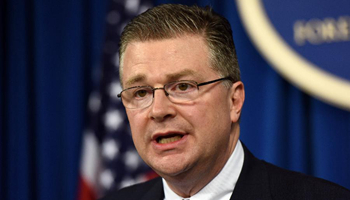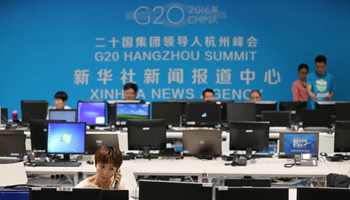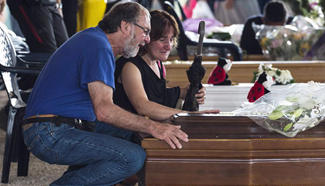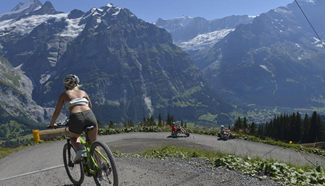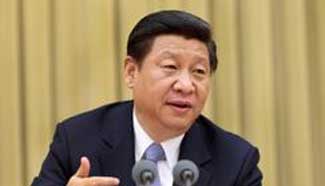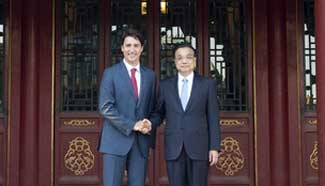By Oliver Trust
BERLIN, Aug. 31 (Xinhua) -- Germany's 2-0 win over Finland was nothing football fans would call a festival. But nevertheless it was a memorable game.
The country's past met its future as a player like midfielder Bastian Schweinsteiger bid farewell in his 121 international appearance while 20-year-old defender Niklas Suele made his debut alongside several other youngsters that will from now on secure their nation's football future.
Football fans witnessed emotional moments as Schweinsteiger could not hold back his tears before kick-off in his last game in a German shirt. The crowd gave the midfielder a standing ovation and applauded him whenever he touched the ball.
Before the game, Schweinsteiger talked in an emotional press conference about his 13-year career in the German national team that culminated in winning the 2014 World Cup final against Argentina by 1-0.
It perhaps fitted the script that 20-year-old Max Meyer of Schalke 04 put Germany 1-0 up by the time Schweinsteiger was substituted in the 67th minute by 20-year-old midfielder Julian Weigl from Borussia Dortmund. Meyer and Weigl are two of the German youngsters that will be a vital part of the German team in the future. Mesut Oezil of Arsenal scored the second German goal.
Loew has to be aware that he will have to change not only his team's game style but his squad too. Two years after the World Cup 2014, the 56-year-old rewarded his world champion players with the guarantee that they would be a part of the German squad or even the starting eleven.
But Euro 2016 has shown the 2014 World Cup title is history and titles in football are history as soon as they have been won. Loew will have to develop the courage to invest more trust in younger players. Leroy Sane who recently joined Manchester City from Schalke for almost 50 million euro did not play a big role during the tournament in France.
Now Loew seems to have heeded the warning signs indicating the need for an update. The tournament in France made two things obvious. The Germans were too strict in following the keep-ball and total game control dogma. It was coupled with the problems changing gear after losing or gaining the ball. Loew named them by saying, "we have to be quicker, when we gain the ball", meaning the German game will have to be more vertical and direct instead of control dominated.
Added to the problem was another which Loew called, "the missing effectiveness in the last third of the pitch." He meant a lack of inventiveness to create enough chances in front of the opponent's goal. And when they did they were not effective enough in turning the chances into goals.
Schweinsteiger and Lukas Podolski have read the signs and have decided to retire from the national team. Now it will be Loew's job to fill the gap with new names, new ideas and new passion.
Next to Schweinsteiger's farewell appearance, the new German generation Meyer, Julian Brandt, Niklas Suele were all part of the German Olympic team that won the silver medal in Rio. Kevin Volland stands for the new German generation Loew will have to rely on. Jonathan Tah, Leon Goretzka, Lukas Klostermann and Jeremy Toljan are among the many German talents emerging on the horizon.
Loew will have a tough job on the road to the 2018 World Cup in Russia. He will have to find a way to make experienced players like Jerome Boateng, Manuel Neuer, Thomas Mueller work well together with the youngsters and new faces of German football.
Right after Euro 2016 and the defeat in the semifinal against hosts France, it took Loew some days to make up his mind if he wanted to continue in charge for the next two years. The 56-year-old thought about the personal motivation he will have to invest. Loew and his advisors realized they had to make radical changes in the squad. A change Loew was not willing to make before the European Championships despite many pundits demanding quicker changes.
This Sunday, Loew's new team will face their first challenge when facing Norway in their first qualifier on the road to Russia 2018. Then the German head coach will have to announce his decision as to who will follow Bastian Schweinsteiger as captain. According to rumors it won't be one of his youngsters but 30-year-old keeper Manuel Neuer.
Schweinsteiger by the way left the pitch with a broad smile on his face. Next to the German bench, Joachim Loew was waiting giving him a big hug, knowing at the same time that a new chapter in German football had just started.


